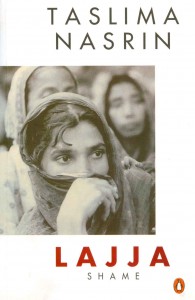 Given that the nation of Bangladesh changed from a secular state to an Islamic country via a constitutional amendment, it’s easy to see why this book has been banned. Taslima Nasrin’s Lajja (Shame) (1993, ISBN 978-014-024-0511) is a strong indictment of the Islamic movement that made pariahs of its Hindu population. This is historical novel that chronicles the privations against the Hindu minority that forced many of them to flee to India from the nation of their birth.
Given that the nation of Bangladesh changed from a secular state to an Islamic country via a constitutional amendment, it’s easy to see why this book has been banned. Taslima Nasrin’s Lajja (Shame) (1993, ISBN 978-014-024-0511) is a strong indictment of the Islamic movement that made pariahs of its Hindu population. This is historical novel that chronicles the privations against the Hindu minority that forced many of them to flee to India from the nation of their birth.
At times, the novel borders on the didactic, with many pages of documented murders, rapes, temple burnings, and land incursions. In its defense, it constitutes, in essence, a Bangladeshi genocide of a minority population.
The story is of an atheist family of Hindu extraction, buffeted by the winds of Islamic persecution. The son is something of an intellectual ne’er do well who continually pontificates and ultimately spins out of control when his sister is kidnapped by a young Islamic mob, which also destroys the family possessions. Western readers who feel that the injustice deserves retribution will be frustrated, as the philosophy of the family is peaceful co-existence, a continuing frustration in the face of violent and seemingly random oppression. The scene that stuck longest with us involved a young Muslim prostitute, a victim of temporary anger, whose suffering only increased the angst of the perpetrator.
Visitors to Bangladesh today can easily be confused when reading a history of the country. It was originally founded as a secular nation. The events promulgating the change to an Islamic nation, as well as its aftermath, are sobering, and this is the book to read for those interested in how it occurred and how it changed the social dynamic of the country. The author, a critic of religious fundamentalism, was forced to leave her country shortly after the book was written.
Freedom of the press is a western construct that is still anathema to many Asian nations, and Bangladesh is no exception. Today, twenty years after this book originally appeared, it remains a powerful treatise, and essential reading for those interested in the ramifications of the formation of a religion-based government as its effects on marginalized peoples. Buy it here at the WoWasis eStore.
Leave a Reply